Search Results
El Cerrito Plaza
This May the 4th take a ride on a BART starship through a galaxy far, far away
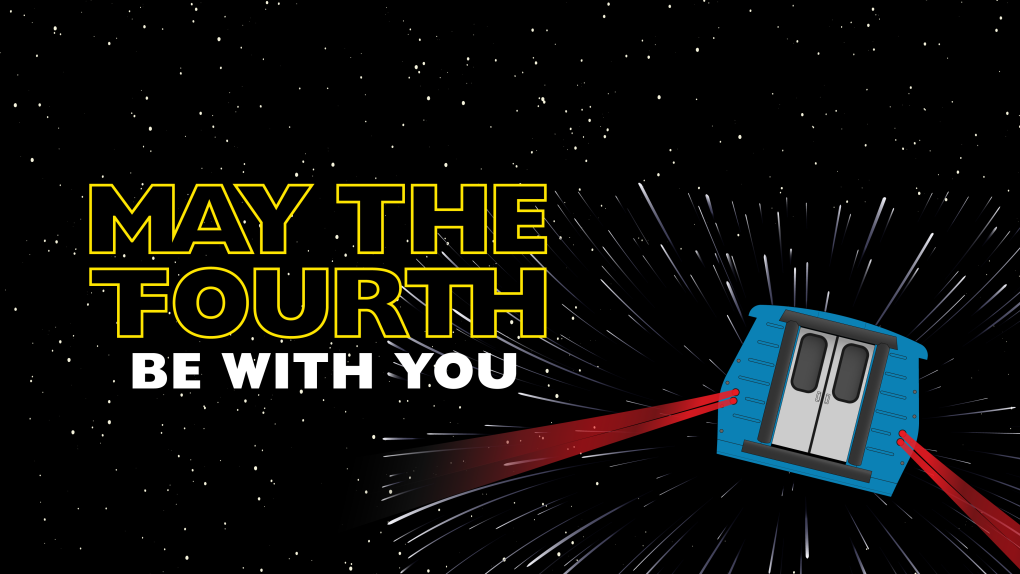
This May the Fourth, BART invites the public on an epic journey through a galaxy far, far away.
On Sunday, May 4, BART will transform a train into a special starship to set the scene for an epic 90-minute ride in celebration of May the Fourth. Bring friends or travel solo. Either way, you’ll leave with an alliance of like-minded pals.
Travelers should dress in apparel fitting for a May the Fourth celebration (please leave the blasters on your home planets). Prizes will be awarded to the best costumes. The admiral of our ship will look kindly on you for incorporating BART into your outfit. You can also expect live music, competitions, trivia, May the 4th decor, and plenty of surprises.
The voyage itinerary: We will depart MacArthur Spaceport at 4pm and make the jump into hyperspace to reach Pittsburg/Bay Point, a space station on the Outer Rim of our system. Our ship will then turn around and make its way back to MacArthur Spaceport with an estimated arrival time of 5:30pm. Pre-boarding will start at 3pm.
Our ship will make no stops for the duration of the 90-minute ride, so attendees should eat and use the restroom before departure. Artificial gravity will be provided for passenger comfort.
Space on our vehicle is limited, and reservations are required via Eventbrite. There is no cost to attend other than paying your BART fare.
When: Sunday, May 4, 4pm to 5:30pm
Check-in opens at 3pm. Arrive no later than 3:30pm.
Where: MacArthur Station
Why: May the 4th be with you
RSVP: Reserve your spot on Eventbrite – bartmaythefourth.eventbrite.com
The e-ticket you receive from Eventbrite is NOT your BART fare. Every participant must have a Clipper card. Make sure you have at least $7.10 (BART’s excursion fare) on the card.
BART is experimenting with hosting events on trains, including the sold-out Valentraine speed dating mixer in February, as a way to engage our community, foster connections, and encourage riding BART. Transit connects us to places, but can also connect us to each other. Learn more about fun stuff happening at BART at bart.gov/fun.
BART officer helps mother find her homeless daughter: “People aren’t mentally ill from 9-to-5”
BART PD Officer Eric Hofstein delivers a care package to a woman whose life he helped save By MELISSA JORDANBART Senior Web ProducerThe care package had a childhood Bible engraved with her name, her favorite Lord of the Rings books, and a photo album with pictures of family members.BART Police Officer Eric
Take BART + Muni to Hardly Strictly at Golden Gate Park this weekend, 9/29-10/1
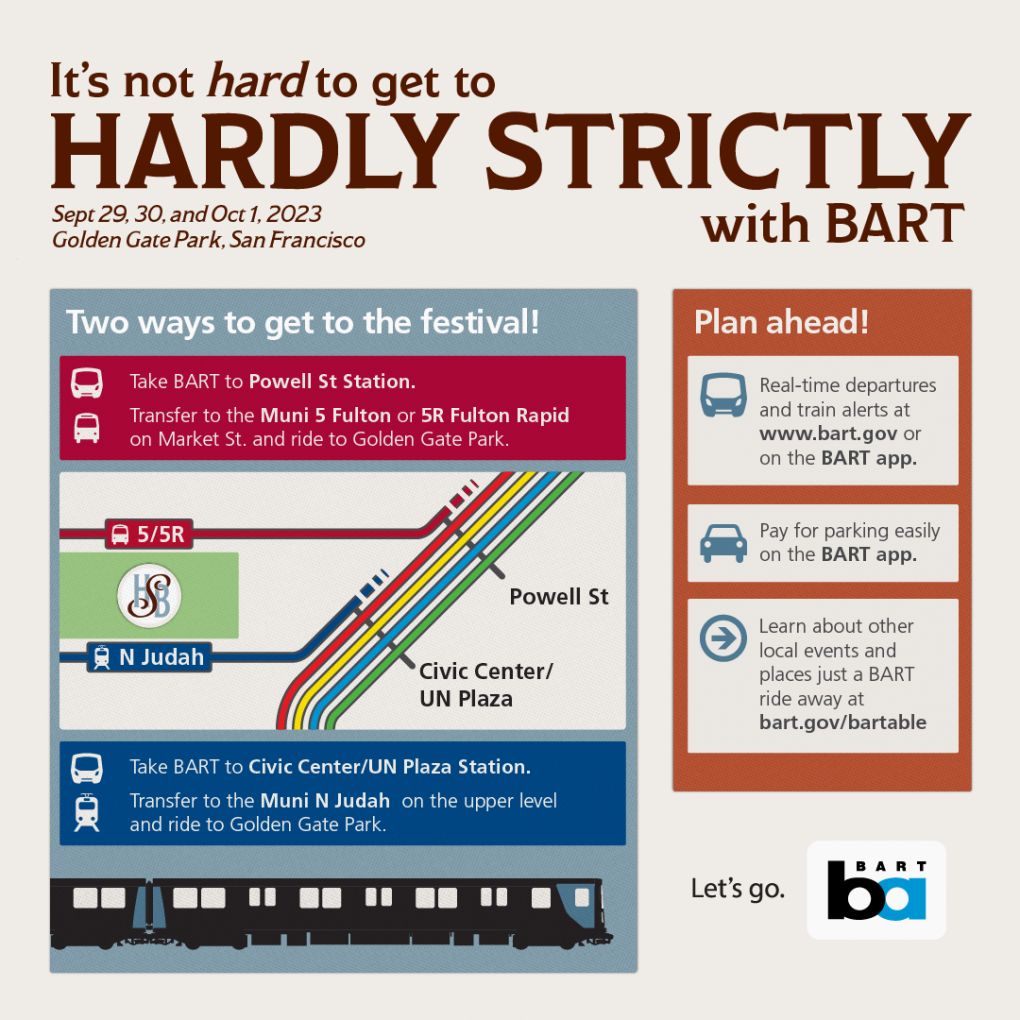
Heading to Hardly Strictly at Golden Gate Park this weekend? Public transit is your best bet there and back, and BART and Muni are here to help!
BART riders heading to Hardly Strictly from the East Bay can take a train to Powell Station. Transfer to a Muni 5 Fulton bus or 5R Fulton Rapid on Market Street and ride to Golden Park.
BART riders coming up from San Mateo County or San Francisco can take a train to Civic Center Station and transfer to a Muni N Judah train on the upper level of the station. The N Judah train will run near Golden Gate Park on Irving and Judah Streets.
Rider Tips
Parking is free at all BART stations except Milpitas and Berryessa (which are operated by VTA) on Saturday, September 30 and Sunday, October 1. Pay for parking easily on the BART app.
Before you leave home put a Clipper card on your cellphone through either Apple Pay or Google Pay. Clipper is waiving the $3 new-card fee for riders who add either of the mobile options. Please ensure you have sufficient funds for a round trip. Plan at the cost of your trip in advance.
Real-time departures and train alerts can be found at bart.gov/eta or on the BART app.
Hardly Strictly is only of many amazing events happening in the Bay Area this weekend! Learn more at BARTable This Weekend here!
Commitment to make BART the Bay Area's safest way to travel extends to infrastructure rebuilding plan
BART’s effort to rebuild its aging infrastructure is on track and is delivering results by improving the system’s reliability and overall safety. That’s the main conclusion from a new annual report issued by the independent panel of experts overseeing the Measure RR rebuilding program. The report will be presented to the BART Board of Directors at its meeting today, August 24.
The independent Bond Oversight Committee’s new Annual Report says through March 2023 $1.57 billion of Measure RR funds had been invested in rebuilding the backbone of BART. There are now 152 RR-supported projects that are in planning, design, construction, or have been completed. A total of 48 projects are complete, up from 36 when the committee issued its previous annual report in 2022.
46% of all anticipated Measure RR work has already been completed. The Bond Oversight Committee wrote the progress is ahead of projections made by BART in 2016 when Measure RR was put before BART District voters. The committee wrote it “believes BART is delivering rebuilding projects in a timely manner and that the work is improving the reliability and safety of the system.”
Significant accomplishments in the last year include:
*Substantial completion of the 34.5kV (kilovolt) traction power cable replacement work in downtown San Francisco.
*Completed trackway demolition and restoration for the Transbay Tube retrofit.
*Station modernization projects completed at Powell Street Station in downtown San Francisco and 19th Street Station in downtown Oakland.
*The number of service delays due to rail-related issues dropped from 217 in 2021 to 95 in 2022.
*Issuance of $700 million in climate-certified Green Bonds to ensure uninterrupted funding of RR projects.
Bond Oversight Committee members have unrestricted access to BART documents, hold quarterly public meetings to review the progress of the Measure RR rebuilding program, and are focused on ensuring BART is spending bond money in a manner consistent with what was promised to voters. You can learn more about the committee at bart.gov/bondoversight.
Measure RR is a $3.5 billion bond measure that was approved by voters in Alameda, Contra Costa, and San Francisco counties in 2016. The Bond Oversight Committee is comprised of seven members who represent a diversity of expertise. The organizations represented on the committee include the American Society of Civil Engineers, the Institute of Electrical and Electronic Engineers, the American Institute of Certified Public Accountants, the Association for Budgeting and Financial Management section of the American Society for Public Administration, the Project Management Institute, and the League of Women Voters.
BART wants to hear from riders on proposed 2026 less-than-inflation fare increase
Update: The survey is now closed.
BART is seeking the public’s input on a proposed January 2026 less-than-inflation fare increase.
BART’s current funding model relies on passenger fares to run safe, clean, and reliable service and to help pay for key improvement projects. BART has a fare increase program that calls for small, regular, less-than-inflation increases every two years, with the next increase of 6.2% scheduled for January 1, 2026. For a short trip like Downtown Berkeley to 19th St./Oakland, the regular fare is estimated to increase by $0.15, and for a longer trip like Antioch to Montgomery, it’s estimated to increase by $0.55.
This proposed increase will help minimize the risk of service cuts while BART explores a long-term funding solution to restore financial stability, as some riders are taking fewer trips than before. Fares continue to be an important funding source to continue to meet the needs of riders who rely on BART.
Your feedback is important! Learn more and share your opinions by taking the survey online at bart.gov/faresurvey2025 or in-station at the locations listed below. The survey closes March 18. Respondents may choose to enter to win a $50 Clipper card at the end of the survey. It is available in multiple languages.
In-station survey locations:
Lake Merritt | Tuesday, March 4, 7am – 9:30am
Pittsburg/Bay Point | Thursday, March 6, 3pm – 6pm
Fruitvale | Monday, March 10, 7am – 9:30am
El Cerrito del Norte | Wednesday, March 12, 3pm – 6pm
Montgomery St | Thursday, March 13, 7am – 9:30am
BART offers the following fare discount programs:
Low-income adults earning 200% or less of the federal poverty level get 50% off through the regional Clipper START program.
Youth 5-18 years old get 50% off with a Youth Clipper card. 4 years and younger ride free.
Seniors 65 and over get 62.5% off with a Senior Clipper card.
The RTC Clipper card is a version of Clipper created for passengers under 65 with qualifying disabilities to provide 62.5% off.
BART offers a “High-value Discount.” Adult Clipper cards get a 6.25% discount on cash value rides by buying $48 worth of value for $45 or $64 worth of value for $60 when autoload is set up with your registered Clipper card.
Monthly “A” Adult Fast Pass + BART within San Francisco: Unlimited rides on all Muni vehicles and on BART within San Francisco (trips outside of these stations are charged full fare). Available for sale from the 17th of the prior month through the 16th of the month.
Students on a school-sponsored field trip for an educational purpose are eligible for a 62.5% discount fare when purchased in advance through Group Sales.
All discounts are set up in advance through Clipper: clippercard.com/discounts
Hear from a panel of experts about a 2026 transportation ballot measure at BART Board Workshop
The BART Board of Directors annual workshop will be held Thursday, February 8, 2024, and for the first time, it will include a lively panel discussion with transit advocates, policy experts, and key stakeholders to discuss what is needed to develop and successfully pass a regional transportation funding measure to provide long-term funding for BART and all Bay Area transit agencies.
The panel discussion is free and open to the public and will take place from 9am-noon in the BART boardroom (2150 Webster Street, Oakland) and on Zoom. This is an exciting opportunity for the BART board, BART employees, news media, and members of the public to hear a variety of perspectives about what transit operators need to do in the next 30 months to achieve a successful transportation measure in 2026, including improvements to the customer experience and policy reforms.
In addition to the experts on the panel, Rebecca Long from the Metropolitan Transportation Commission will help us set the stage for the discussion, as they are leading the effort to secure long term funding for transit.
Public comment related to the panel topic will be taken at the end of the panel discussion.
The second half of the Board Workshop will include informational staff presentations on BART’s operating budget projections and BART’s capital program to fund and deliver projects that ensure safe, reliable, and frequent service. Staff will also introduce a new customer commitment and review the changes underway to improve the customer experience.
View the agenda and presentations.
Panel Details
Moderator: Karen Philbrick, PhD, Mineta Transportation Institute, San Jose State University
Panelists:
• Alicia John-Baptiste, President and CEO, SPUR
• Darrell Owens, Policy and Data Analyst and Advocate, East Bay Transit Riders Union
• Emily Loper, Vice President of Public Policy, Bay Area Council
• Ian Griffiths, Co-Founder and Policy Director, Seamless Bay Area
• Jeff Shaffer, President/Business Agent, Local 1277, Amalgamated Transit Union (ATU)
When: February 8th, 9am-noon
Where: In person in the BART Boardroom, 2150 Webster Street, Oakland, or via Zoom by calling
833-548-0282 and entering access code 822 5984 8450 or logging in to Zoom.com and entering
access code 822 5984 8450.
On Jan. 1, BART fares to increase 5.5%, low-income fare discount to increase to 50%
A modest fare increase and a deeper discount on fares for qualifying lower-income riders will both go into effect on Monday, January 1, 2024.
The Clipper START means-based fare discount for BART will increase from 20% to 50%, meaning low-income riders will pay half the regular fare. The Metropolitan Transportation Commission pilot program offers discounts for Bay Area residents aged 19-64 earning under 200% of the federal poverty level. Clipper START is accepted by more than 20 regional transit operators in addition to BART.
Fares will increase by 5.5% beginning January 1, raising the average fare by 23 cents to $4.43. A 12-mile trip from Downtown Berkeley to Embarcadero, for example, will increase by 25 cents to $4.75. For a 45-mile trip from Antioch to Montgomery Street, the fare will increase by 40 cents to $8.60.
The fare increase was approved by BART’s Board of Directors during the June 8, 2023, budget vote. The Board decided to deviate from its policy of approving a fare increase every two years. BART’s Inflation-Based Fare Increase Program, which has been in place since 2003, would have required an 11% fare increase in January 2024. To cushion the economic impact on riders, the Board directed staff to instead raise fares 5.5% in January 2024 and again at the same rate in January 2025.
BART’s Trip Planner and online Fare Calculator have been updated with the new fares. Riders can look up their new fare by selecting a date of January 1, 2024, or beyond. New fare chart decals will be posted at vending machines.
Fares Fund Operations
The fare increases are expected to bring in an additional $26 million in operating funds through FY25.
Historically, BART relies on rider fares to fund safe, reliable, and clean service – more so than most other transit systems. This requires small but frequent fare increases to keep up with the cost of inflation.
New Fare Gates Being Deployed
Because our riders are directly responsible for funding our operations, BART is rolling out new fare gates in 2024 to protect against fare evasion and self-enforce fare payments.
Low-Income Riders Will Pay Less in 2024
Even with the fare increase, low-income riders will pay less for BART because the Clipper START discount is being increased to 50%.
BART Discounts
- Youth 5-18 years old get 50% off with a Youth Clipper card.
- Seniors 65 and over get 62.5% off with a Senior Clipper card.
- Low-income riders get 50% off starting Jan. 1, 2024, through the regional Clipper START program, available to adult riders earning 200% or less of the federal poverty level.
- The RTC Clipper card is a version of Clipper created for passengers under 65 with qualifying disabilities for 62.5% off fares.
- BART offers a “High-Value Discount.” Adult Clipper cards get a 6.25% discount on cash value rides by buying $48 worth of value for $45 or $64 worth of value for $60 when autoload is set up.
Not One More Girl safety events planned at two BART stations 9/28 and 10/5
BART officials will be joined by community partners at two safety events as part of the Not One More Girl initiative to educate riders about safe bystander intervention tactics and preventing sexual harassment on BART.
Event Details
- Thursday, September 28, 2023, at Downtown Berkeley BART Station from 12pm-3pm. View the Flyer.
- Thursday, October 5, 2023, at Lake Merritt BART Station from 12pm-3pm. View the Flyer.
The Not One More Girl team will host these "Bystander Safety Zone" events to hand out our new bystander intervention safety cards and other informational material from the campaign, while speaking to riders about tangible things we all can do to make BART safer for youth.
Not One More Girl is a BIPOC youth-led initiative in partnership with community-based organizations and BART to end gender-based violence. Phase II of the campaign launched last month.
- View a PDF of the "I Got You" bystander intervention card.
- View a PDF of the "You Got Me?" bystander intervention card.
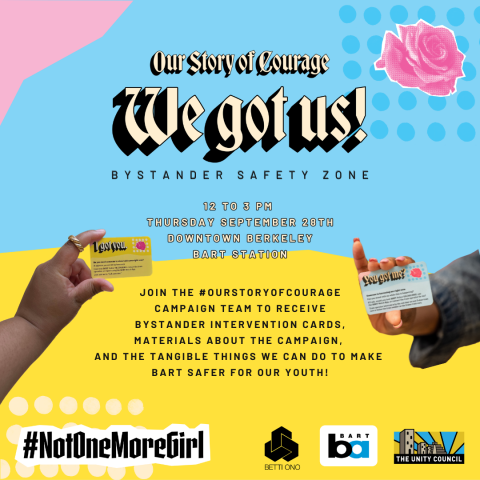
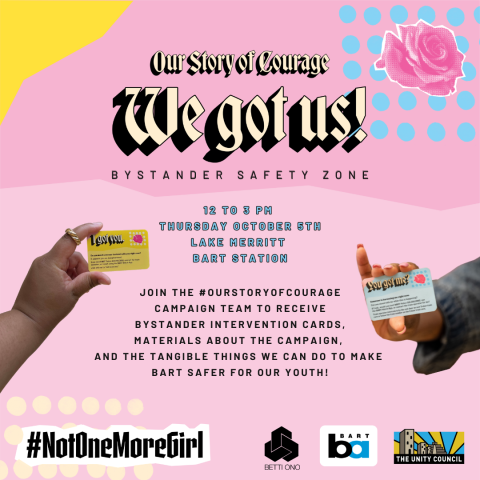
Bystander Intervention Cards for Riders
Two distinct wallet-size cards are now available to riders to discreetly hand to people to signal they need help or support, or to notify someone being harassed that you are there to help and support them.
These new bystander intervention cards are a concept developed by the youth design team, who expressed the need for options when asking for help or approaching a situation of potential harm. The cards include the slogans “I Got You” and “You Got Me?” with a list of actionable items riders can take to help a situation, from reporting the harassment to simply standing with someone. As young people are still trying to find their voices and figuring out how to navigate and decipher harassment, a physical card you can hand someone is an effective tool to precipitate the shift from being a bystander to becoming an agent of change.
The cards are available for pick up at each Station Agent booth at BART, and Ambassadors and Crisis Intervention Specialists will carry the cards and give them out when engaging riders. BART and the Betti Ono Foundation will also work to distribute the cards to youth through community organizations, events, and schools.
BART's Mark Nagales honored his grandmother’s memory with one final trip on a legacy train
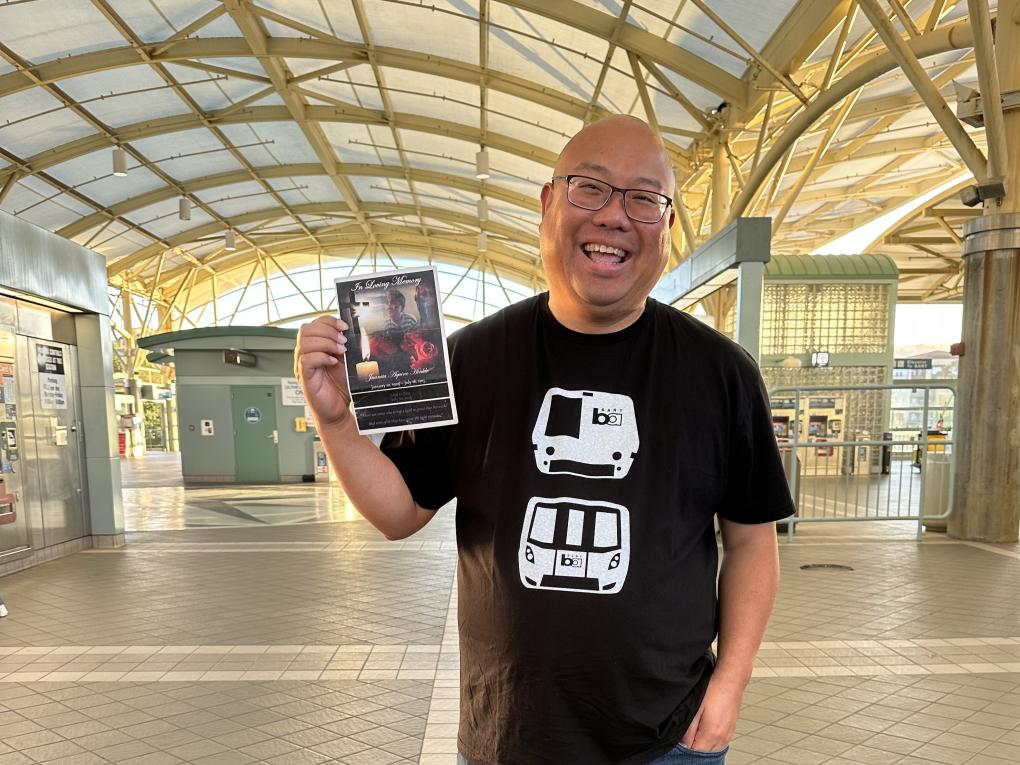
Mark Nagales is pictured at Millbrae Station with the program from his grandmother's 2015 memorial service.
Mark Nagales’s earliest childhood memory is riding a BART train with his grandmother. He can recall the colors most of all – the blue seats, golden carpet, all the ads and people and scenery streaming by the giant windows.
“Growing up, everything in my house was white, so it stuck out to me how vibrant the BART trains were. I’ll never forget the colors of those legacy trains,” said Mark, who joined BART in 2023 as a Senior Government and Community Relations Representative.
Every weekend for years, preschooler Mark and his grandmother, Juanita, would take BART from their home in South San Francisco in search of adventure. Often that meant simply riding the Yellow Line an hour or so from South San Francisco Station to Concord.
“We didn’t have a lot of money, so going to Concord to see relatives was like a vacation,” Mark said. “I didn’t get out of the sphere of South San Francisco often, so looking out the windows on BART, I was wide-eyed. I’d never seen so many places before. It was like traveling to a new world.”
On BART days, Mark remembers waking up early with his grandma and going to McDonald’s for a 20-piece McNuggets meal – a quick snack before they walked to the station and caught a train. Grandma Juanita didn't like driving outside of her small neighborhood, “but she always felt comfortable on BART,” Mark said.
Onboard, Mark stayed glued to the windows, his hands and nose leaving tiny streaks on the glass. He admits that he sometimes had trouble sitting still onboard – there was just so much going on, so much to see! Grandma Juanita didn’t mind the high energy.
“She just loved that I was happy,” Mark said. “And she loved that I was with her.”
When Mark learned the last in-service legacy train would be taking its final ride on Sept. 10, 2023, (BART officially retired the legacy fleet at a celebration in April 2024), he knew he had to be on that train. And he knew he had to bring his grandmother, who passed away in 2015, with him.
So Mark gathered his wife and two children, and together, they rode the old BART train into San Francisco. During the ride, he held the program from his grandmother’s memorial service.
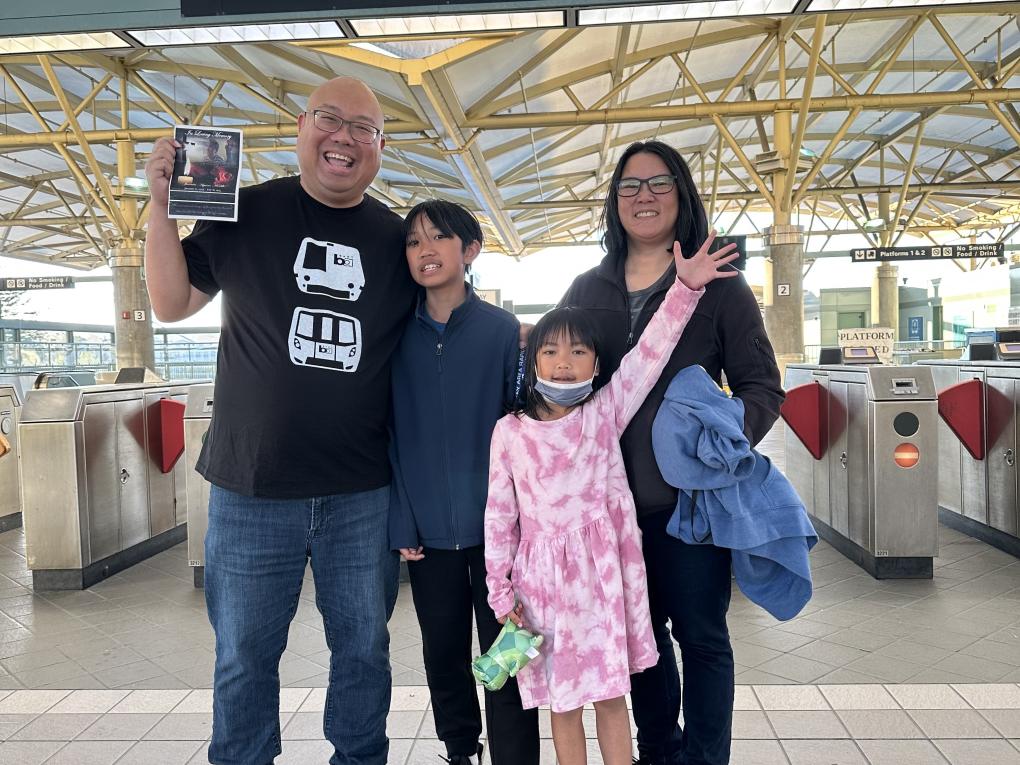
Mark Nagales and his family pose on the concourse at Millbrae Station.
“It was a full circle moment for me,” he said. “That ride was a way to say thank you to my grandmother and to honor her memory.”
That legacy train ride was something of a transit party with lots of people taking photos, shaking hands, and swapping their favorite BART memories tied to these old trains.
Mark expected the experience to be a bit emotionally challenging, but once the ride began, it was nothing but celebration and good cheer.
“I couldn’t stop smiling because I just kept thinking about my grandma and how proud she’d be if she could see me now. And the best part was that I was able to experience it with my own family.”
Mark immigrated from the Philippines to South San Francisco when he was one year old. Many of his earliest memories revolve around his grandmother, who took care of him when his parents were working multiple jobs at San Francisco International Airport. It was rare for Mark to have both his mom and dad home at the same time.
“The constant in my life was my grandma,” Mark said. “She taught me how to be loving, caring, and kind because that’s how she treated me.”
At one point, Grandma Juanita took a part-time job at the airport. She didn’t have to work, but wanted to in order to make sure her grandson could have everything he might need.
"We didn’t have much back then,” Mark explained. “But love was always abundant.”
Mark is the first person in his family to not to work at SFO. He nonetheless honors his family’s transportation lineage through his work at BART. When he received the official offer letter, Mark said all he could think about was being five years old, holding his grandmother’s hand on BART.
“To be able to work at the transit agency that opened the world to me...there are no words,” he said. “When I started working here, it felt like home. It made me think about all the things my grandma and family experienced and all the families who are currently experiencing the same things. I know BART is making a difference for them like it did for us.”
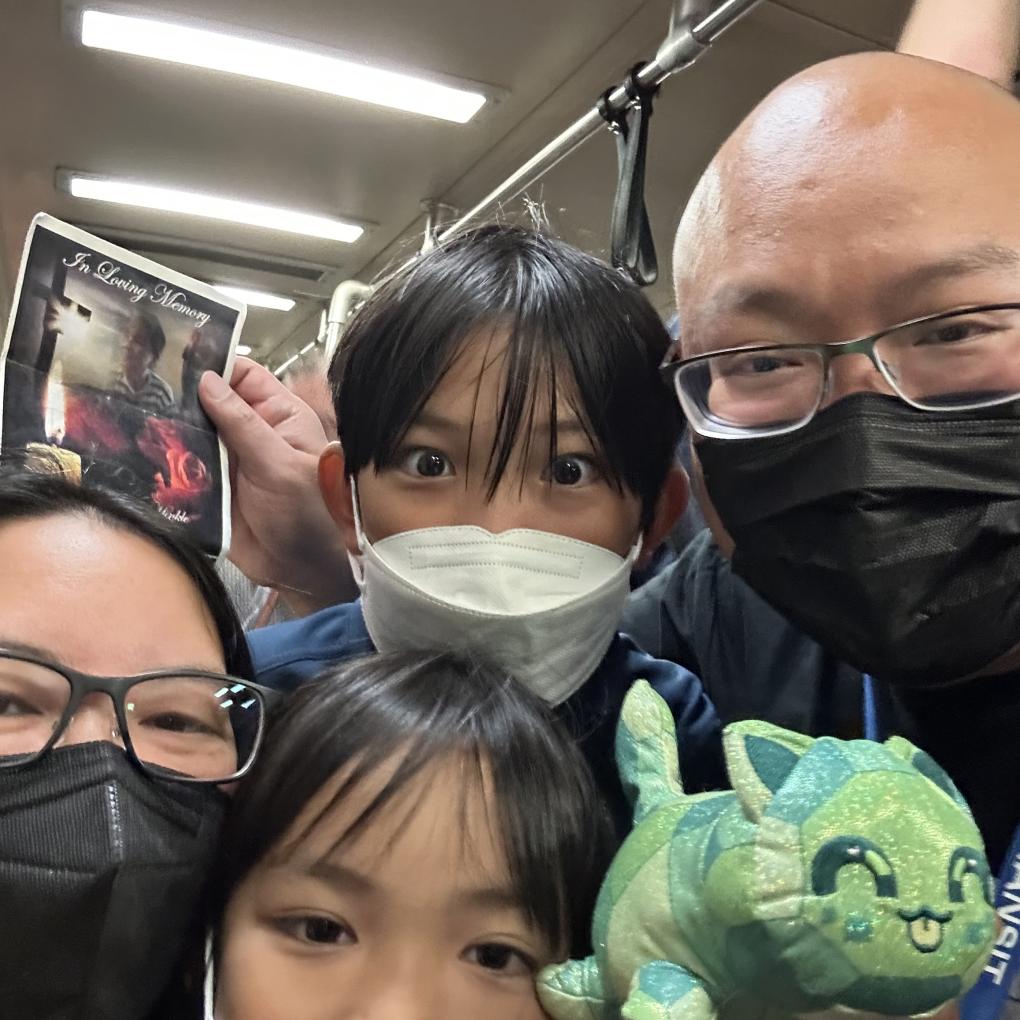
Mark Nagales and his family pose for a selfie on a legacy BART train.
Mark and his family still live in South San Francisco and even serves on the city council. His parents are just a few minutes down the road, and like Grandma Juanita, Mark’s mom loves to spend time with his eight-year-old daughter, Josephine, to take her around the Bay on BART.
Now that he has children of his own, Mark gets to experience the same feelings his grandmother experienced when she got to watch him play and learn and grow.
“When you’re a kid, you don’t realize how happy it makes your parents or grandparents see you experience joy,” he said. “When my kids get to be my age, they’ll look back like I’m doing now and realize how much these special moments meant to their dad.”
Mark’s final ride on the legacy train was one such special moment, and to share it with his beloved Grandma Juanita and his own family meant everything to him.
And it turns out the apple doesn’t fall far from the tree.
“On the train, my kids do exactly what I used to do -- putting their hands on the windows, playing around on the seats. I’m always like, ‘Don’t do that!’” Mark said. “You know, I bet my grandma once said the same thing to me.”